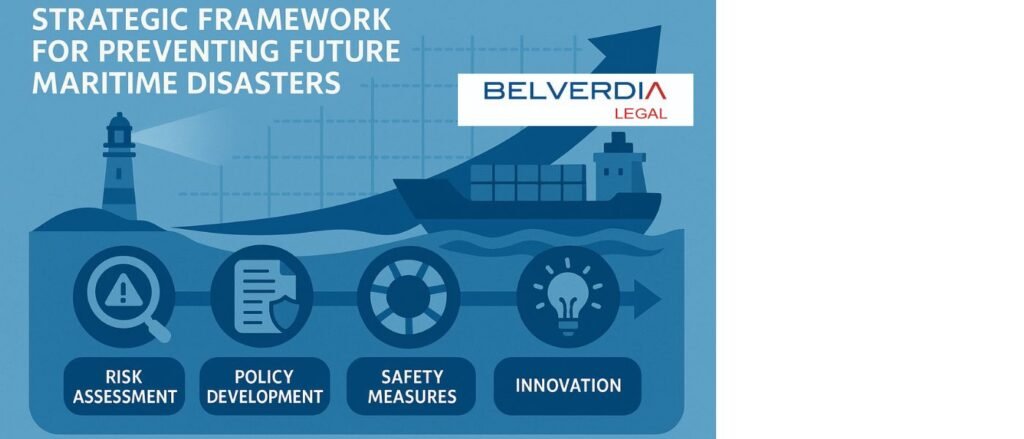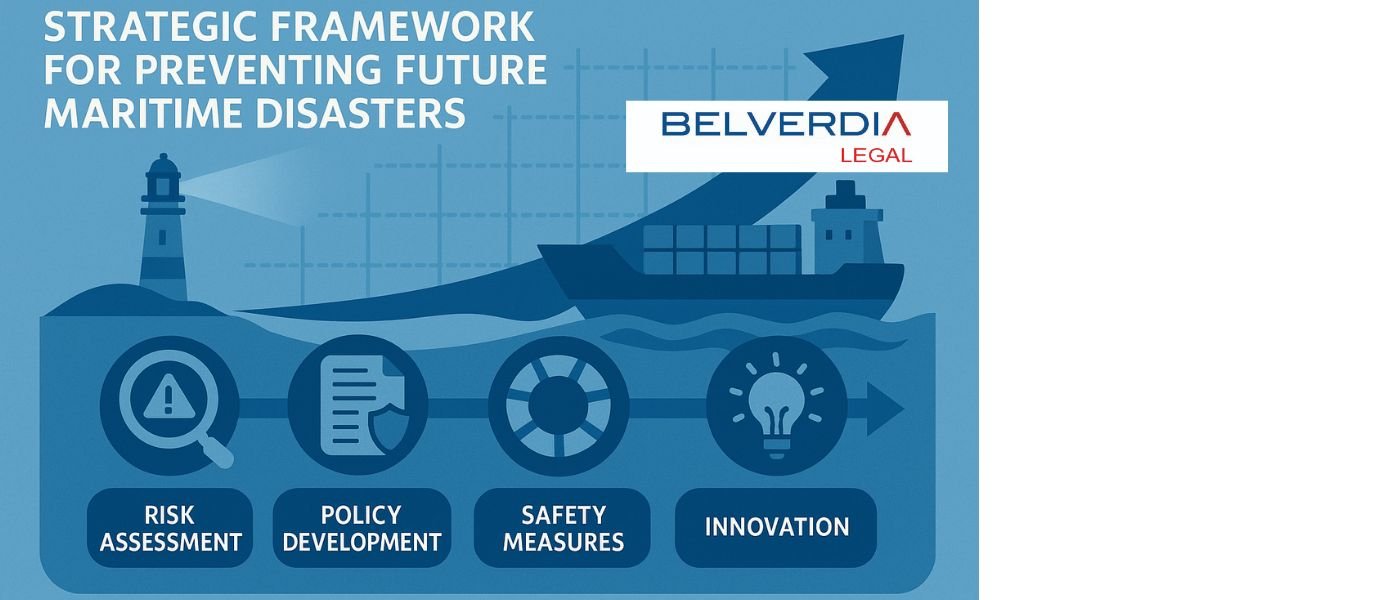The MSC ELSA-3 incident highlights critical gaps in maritime regulatory oversight, environmental compliance, and coastal security. To address these vulnerabilities and prevent future maritime disasters, India must adopt a comprehensive, proactive strategy. This framework outlines actionable measures across ecological security, coastal surveillance, ESG (Environmental, Social, Governance) enforcement, and maritime sovereignty, emphasizing pre-entry controls, infrastructure enhancements, legal reforms, environmental monitoring, international cooperation, and community empowerment.
I. Pre-Entry Controls and Maritime Risk Vetting
1. Advanced Maritime Risk Assessment System (AMRAS)
To bolster maritime safety and ecological security, India must implement the Advanced Maritime Risk Assessment System (AMRAS), mandating real-time electronic disclosure of critical vessel data prior to port entry. Key requirements include:
- Cargo Manifest: Detailed disclosure, including hazardous material classifications.
- ESG Compliance History: Records of the vessel’s environmental and social governance performance.
- Insurer and P&I Club Credentials: Verification of protection and indemnity insurance.
- Pollution Incident History: Documentation of prior environmental violations.
AMRAS will be managed through the Coastal Regulatory Intelligence Platform (CRIP) under the Directorate General of Shipping, ensuring stringent vetting and risk mitigation.
2. High-Risk Vessel Blacklisting Protocol
A robust High-Risk Vessel Blacklisting Protocol will target vessels operating under Flags of Convenience (FoC) with poor compliance records. Key measures include:
- Intensified Inspections or Denial of Port Access: High-risk vessels will face rigorous scrutiny or be barred from Indian ports.
- Leveraging Global Databases: Utilize IMO and INTERPOL databases to identify and flag operators with deficient ESG records.
II. Strengthening Coastal and Port Security Infrastructure
3. Integrated Coastal Surveillance Grid (ICSG+)
To enhance maritime surveillance, the existing Coastal Surveillance Network (CSN) will be upgraded into the Integrated Coastal Surveillance Grid (ICSG+) through:
- Inter-Agency Integration: Seamless coordination among port authorities, Indian Navy, Coast Guard, Customs, and Pollution Control Boards.
- Real-Time Satellite Monitoring: Continuous tracking of non-Indian flagged vessels within India’s Exclusive Economic Zone (EEZ).
4. Port State Control (PSC) Augmentation
Port State Control (PSC) inspections will be strengthened in alignment with international standards (MARPOL, SOLAS, ISM Code) and supplemented by:
- Mandatory Environmental Safety Clearance (ESC): Issued by the Ministry of Environment, Forest and Climate Change (MoEFCC) for vessels carrying hazardous materials.
III. Institutional and Legal Reforms
5. Mandatory ESG Compliance Certification
To enforce environmental and ethical maritime practices, all foreign vessels docking in India must obtain:
- Environmental Impact & Preparedness Declaration: Outlining measures to mitigate ecological risks.
- Human Rights Assurance Audit: Mandatory for vessels from FoC jurisdictions to ensure compliance with labor and ethical standards.
Non-compliance will result in denial of port clearance and downgrading of insurance risk ratings.
6. Legislative Amendments
Reforms to the Merchant Shipping Act and Environment Protection Act will introduce:
- Stringent ESG Obligations: Mandatory for vessels operating within India’s EEZ.
- Environmental Threat Vessels (ETVs): Classifying high-risk vessels as national security threats, akin to terror risks.
- Disaster Bond Insurance: Mandatory for ships carrying hazardous cargo to cover potential environmental damages.
IV. Environmental Monitoring and Emergency Preparedness
7. Coastal Ecological Early Warning System (CEEWS)
A proactive Coastal Ecological Early Warning System (CEEWS), leveraging AI and satellite data, will be deployed to detect:
- Oil slicks and chemical discharges.
- Shipwreck risks and abnormal environmental activities.
This initiative will be a collaborative effort between the MoEFCC, Indian Space Research Organisation (ISRO), and Indian National Centre for Ocean Information Services (INCOIS).
8. Rapid Environmental Response Task Force (RERTF)
A multidisciplinary Rapid Environmental Response Task Force (RERTF) will be established, comprising:
- Maritime engineers.
- Toxicologists.
- Human rights officers.
- Marine biodiversity specialists.
The RERTF will ensure swift, coordinated responses to maritime environmental incidents.
V. International Maritime Engagement
9. Maritime ESG Treaty Proposal
India will champion a Regional Maritime ESG Treaty under frameworks like BIMSTEC or the Indian Ocean Rim Association (IORA), focusing on:
- Joint liability frameworks for environmental damages.
- Mandatory ESG audits for vessels.
- Cross-border environmental compensation policies.
10. P&I Club Regulation and Transparency Charter
India will advocate for a Global P&I Regulation Authority under IMO or UNCLOS reforms, ensuring:
- A public registry of all Protection and Indemnity (P&I) claims and shipowner liabilities.
- Enhanced transparency in maritime insurance practices.
VI. Cultural and Human Rights Safeguards
11. Coastal Rights Tribunal (CRT)
A specialized Coastal Rights Tribunal (CRT) will be established to address:
- Cultural rights violations.
- Livelihood destruction due to maritime incidents.
- Coastal health emergencies.
The CRT will operate in coordination with the National Human Rights Commission (NHRC) and State Legal Services Authorities.
12. Community Resilience and Legal Empowerment Program
To empower coastal communities, a Community Resilience and Legal Empowerment Program will provide:
- Legal training on filing ESG-related claims.
- Satellite-based alert apps for real-time environmental monitoring.
- Access to environmental litigation funds for affected communities.
Conclusion
The MSC ELSA-3 incident underscores systemic failures in maritime governance, necessitating a paradigm shift. By treating maritime environmental threats as national security emergencies, India can safeguard its coastal ecosystems and assert maritime sovereignty. This strategic framework integrates advanced risk vetting, robust surveillance, legal reforms, environmental monitoring, international cooperation, and community empowerment to prevent future maritime disasters and ensure sustainable maritime governance.
Prepared by:
Adv. Anil Thomas (sr. Partner)
Assistance rendered by:
Adv. Lakshmi Menon & Adv. Rahul Varma


